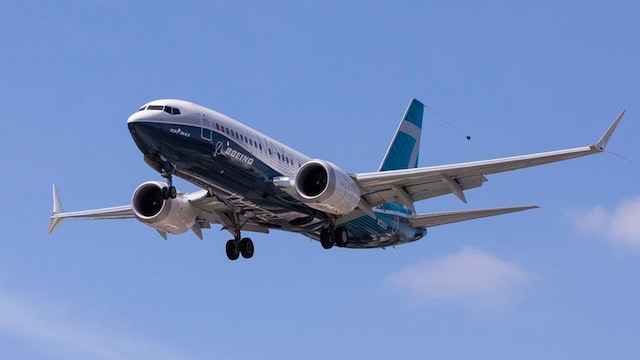US aviation authorities set new inspection for Boeing 737 MAX 9 doors amid safety issues
US’s Federal Aviation Administration is recommending airlines flying the Boeing 737-900ER to inspect door plugs to ensure proper security, following reports of unspecified bolt issues
The US Federal Aviation Administration (FAA) has issued a recommendation for airlines operating Boeing 737-900ER jets to inspect door plugs to ensure proper security, following reports of unspecified bolt issues during inspections as per Reuters.
The move comes after the recent grounding of 171 Boeing 737 MAX 9 planes, prompted by a mid-air cabin blowout of a door plug on an Alaska Airlines MAX 9 jet on January 5.
While the 737-900ER is not part of the newer MAX fleet, it shares the same optional door plug design, allowing for an additional emergency exit door when carriers choose to install more seats.
Related Articles

Vantage | Why Boeing plane’s door accident has spooked flyers

Tech & Trade: Will 737 Max door blowout blow away Boeing’s profits too?
The FAA, through a “Safety Alert for Operators,” disclosed that some airlines conducting additional inspections on the 737-900ER mid-exit door plugs found issues with bolts during maintenance inspections.
The recommendation urges air carriers to perform crucial portions of a fuselage plug assembly maintenance procedure related to the four bolts securing the door plug to the airframe “as soon as possible.”
Boeing expressed full support for the FAA’s action, emphasizing their commitment to safety. The 737-900ER model has been in operation since 2007, with the last delivery in 2019, as reported by Reuters.
Alaska Airlines and United Airlines, the only two U.S. carriers using the MAX 9, reported loose parts on grounded MAX 9 aircraft, leading to thousands of flight cancellations. The FAA stated that MAX 9 planes will remain grounded until deemed safe to return to service, with United extending cancellations through January 26.
In contrast, the 737-900ER, with over 11 million hours of operation and 3.9 million flight cycles, has not experienced issues with the door plug.
United and Alaska have initiated inspections on their 737-900ER fleets, expecting completion without disruptions. Delta Air Lines, another operator of the 900ER, has proactively inspected its fleet, anticipating no operational impacts.
Globally, US carriers operate the majority of 737-900ERs with door plugs. The FAA is continuing to review data from inspections of 40 Boeing 737 MAX 9 jets as part of the process to determine when the planes can resume flights.
FAA Administrator Mike Whitaker emphasized the agency’s commitment to restoring confidence in the integrity of these plug doors, while the National Transportation Safety Board continues its investigation into the Alaska Airlines incident, says the Reuters report.
(With inputs from agencies)

US’s Federal Aviation Administration is recommending airlines flying the Boeing 737-900ER to inspect door plugs to ensure proper security, following reports of unspecified bolt issues
The US Federal Aviation Administration (FAA) has issued a recommendation for airlines operating Boeing 737-900ER jets to inspect door plugs to ensure proper security, following reports of unspecified bolt issues during inspections as per Reuters.
The move comes after the recent grounding of 171 Boeing 737 MAX 9 planes, prompted by a mid-air cabin blowout of a door plug on an Alaska Airlines MAX 9 jet on January 5.
While the 737-900ER is not part of the newer MAX fleet, it shares the same optional door plug design, allowing for an additional emergency exit door when carriers choose to install more seats.
Related Articles

Vantage | Why Boeing plane’s door accident has spooked flyers

Tech & Trade: Will 737 Max door blowout blow away Boeing’s profits too?
The FAA, through a “Safety Alert for Operators,” disclosed that some airlines conducting additional inspections on the 737-900ER mid-exit door plugs found issues with bolts during maintenance inspections.
The recommendation urges air carriers to perform crucial portions of a fuselage plug assembly maintenance procedure related to the four bolts securing the door plug to the airframe “as soon as possible.”
Boeing expressed full support for the FAA’s action, emphasizing their commitment to safety. The 737-900ER model has been in operation since 2007, with the last delivery in 2019, as reported by Reuters.
Alaska Airlines and United Airlines, the only two U.S. carriers using the MAX 9, reported loose parts on grounded MAX 9 aircraft, leading to thousands of flight cancellations. The FAA stated that MAX 9 planes will remain grounded until deemed safe to return to service, with United extending cancellations through January 26.
In contrast, the 737-900ER, with over 11 million hours of operation and 3.9 million flight cycles, has not experienced issues with the door plug.
United and Alaska have initiated inspections on their 737-900ER fleets, expecting completion without disruptions. Delta Air Lines, another operator of the 900ER, has proactively inspected its fleet, anticipating no operational impacts.
Globally, US carriers operate the majority of 737-900ERs with door plugs. The FAA is continuing to review data from inspections of 40 Boeing 737 MAX 9 jets as part of the process to determine when the planes can resume flights.
FAA Administrator Mike Whitaker emphasized the agency’s commitment to restoring confidence in the integrity of these plug doors, while the National Transportation Safety Board continues its investigation into the Alaska Airlines incident, says the Reuters report.
(With inputs from agencies)
